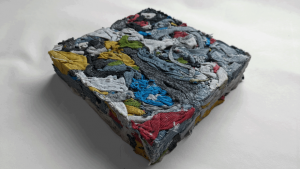In this episode of Kenyan digital artist Jepchumba’s Future Lab Africa podcasts Kenyan electronic musicians Just a Band discuss their musical journey and their responsibilites to their craft.
Just a Band comprises Bill "Blinky" Sellang, Dan Muli and Mbithi Masya. Despite their fame and the eight years since they released their first album, the three artists still seem shell-shocked at the well-deserved attention that their music has garnered.
Its crazy that we get to come to South Africa and collaborate with people you were listening to a year ago and going crazy over their stuff, now we get to meet them and learn about their process.
Jepthumba visited them early on their career after hearing their songs and become friends with the three musicians. She describes how she expected to see an expensive recording set up but instead was led to a bathroom of their apartment where they had half a dozen old PC’s. It was from there that they found their sound and created their strong virtual presence through photography and animation, in a similar vein to that of Gorillaz.
Masya describes himself as “sort of a musician” but he is also a talented filmmaker and visual artist.
It’s the area that where I rank my talents least, it’s the last thing I picked up. Music itself was something I didn’t think I could do but recently I’ve been making stuff and thinking ‘woah’… One day I’ll day I’ll say I’m a virtuoso.
Just a Band had to teach themselves everything they needed to know. They admit they could have asked for help, but no one was doing what they were doing, nor could anyone really relate to their vision. In the early days they had to fight to be accepted as artists and accept the successes and failures that went with being unknown in the industry with no music background to lean on, learning lessons . They were so unsure of their capabilities that they weren’t ever sure when a track was complete.
Eventually they would decide to “just release it and see what happens”. What happened was the construction of new avenues of music, desperately needed in a country like Kenya where young musicians don’t necessarily have the resources to explore and be led in new directions.
The continent has a ceiling on very many things, so it would have been hard to follow someone’s advice to the letter because we were trying to find another path in all of that.
They’ve come a long way in the eight years since those early days, and now unintentionally have become the spokespeople for the Kenyan electronic music scene.
"As long as people understand that we are fundamentally just human creatives trying to make some cool stuff… It’s an opportunity and an honour to change the narrative about what people talk about then they talk about the country and the continent.”






